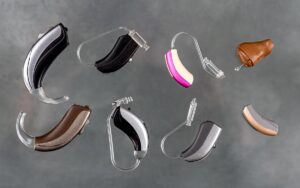Convenience is something we all love. So it’s easy to realize the attraction of hearing aids that you can buy at your local store or pharmacy. No waiting, no fitting, just instant gratification. But this rosy vision of the future might call for deeper investigation.
Store bought hearing aids may start popping up in stores near you so a little caution is required. And that puts a lot of burden on consumers like you to understand what’s what. If you don’t get it right your hearing could suffer which makes the stakes for these decisions very high. So, with great ease comes great responsibility.
What Is an Over-The-Counter Hearing Aid?
In some sense, an over-the-counter hearing aid has some similarities with other hearing aids. In order to counteract the effects of hearing loss, these devices are manufactured to amplify sound. OTC hearing aids, in this regard, have advanced to some extent.
But the process of purchasing an OTC hearing aid is a little more complex than buying a bottle of ibuprofen. Here’s how it should work:
- You should have a hearing screening and receive an audiogram.
- Your general hearing health, specifically what frequency you’re having a difficult time hearing, will be in your audiogram.
- Your distinct hearing loss parameters will determine what the correct solution should be. The reality is that some forms of hearing loss can’t be effectively managed with over-the-counter devices. Even if your specific type of hearing loss can be handled in this way, you still need to select one that will work best for your scenario.
This strategy should, at least in theory, allow you to pick the proper device for your hearing loss situation. That doesn’t necessarily mean your local pharmacy will have that device in stock, however, and close enough isn’t sufficient with regards to your hearing.
The Responsibility Part
This all seems pretty good, in theory. For some, OTC hearing aids will reduce the costs involved and let more people enjoy healthier hearing. But we weren’t kidding when we said it places a large amount of responsibility on the shoulders of consumers.
When a consumer goes right from an audiogram to an OTC hearing aid, this is what they lose out on:
- Adjustments: We can make a few types of adjustments that can help your hearing aid function better in a variety of common situations. You can have presets that help you hear in quiet settings and other presets for louder situations like crowded restaurants. This kind of fine-tuning can be essential to the long-term enjoyment of your hearing aids.
- Testing: When you get fitted for a hearing aid, we will also test it’s functionality. This includes testing it while you’re still in the office and making certain it works as intended for you.
- Advice: Tiny though they are, hearing devices can be complicated to program. How to take care of your hearing aid, how to use it effectively, and how to adapt to your new hearing level, are some of the things we can walk you through.
- A better selection: We can fit you with one of the numerous styles of hearing aids that we offer at various price points programmed to your specific hearing needs.
- A good fit: We help you select a design and fit of hearing aid that will feel comfortable in your ears. To ensure maximum comfort and a custom fit a mold of your ear can sometimes be cast. Getting a good fit will help make certain that you are comfortable enough to wear it every day. Your ability to hear is also affected by fit. If the device is too loose in your ear canal, you’ll be more likely to get feedback.
These are just a few of the benefits you get when you come in for advice.
We’re not saying that over-the-counter hearing aids are a bad thing. But when you are making your selection, you should use some care, and in addition to getting the technology you want, including your hearing specialist will help you receive the care you need.
[blogcta]





